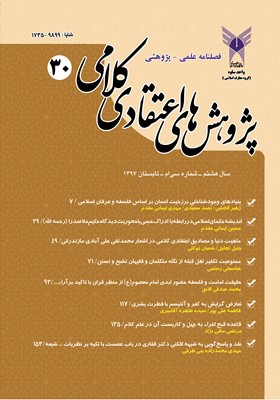نقد و پاسخگویی به شبههافکنی دکتر قفاری در باب عصمت با تکیه بر نظریات متکلمان شیعه
محورهای موضوعی : کلام اسلامی
1 - دانشگاه فرهنگیان
کلید واژه: عصمت, قفاری, کتاب اصول مذهب الشیعه الامامیه اثنی عشریه, متکلمان شیعه. ,
چکیده مقاله :
پژوهش در باب فقه امامیه و کلام شیعه، از دیرباز در میان اهل سنت طرفدارانی داشته است، چنان که متکلم معتزلی؛ قاضی عبدالجبار در کتب خود از جمله المغنی، به نقد آرای امامیه پرداخته است. از همان دوران، شیعه با استقبال از این متون، ضمن احترام به نویسنده، به نقد آنها اقدام کرده؛ شرح یا ردیه نوشته است. چنانکه سیدمرتضی در آثار خویش، به این شبهات پاسخ گفته است. در عصر کنونی که تقریب مذاهب در کشورهای اسلامی به عنوان اصلی اخلاقی و دینی پذیرفته شده است، این جدل های مذهبی جای خود را به یافتن موارد مشترک در اصول عقاید و تأکید بر آنها داده است. در عربستان سعودی، جریانات فکری وهابی، که اعتقادی به تقریب مذاهب ندارند، با حمایت جدی حاکمیت، ناجوانمردانهترین اتهامات را به مذهب شیعه وارد می کنند و شبهاتی مطرح می نمایند که از اساس، رنگ و بوی سفسطی دارد. کتاب اصول مذهب الشیعه الامامیه اثنی عشریه، رساله دکتری تخصصی ناصر القفاری از علمای وهابی سعودی، همچنان که از نام کتاب پیداست، به بررسی بنیادهای فکری و فرهنگی و دینی شیعه پرداخته است. نگارنده، با توجه به شبهه مطرح شده در باب «عصمت» در کتاب مذکور، کوشیده است با آرای دو تن از متکلمان شیعه مذهب؛ سیدمرتضی و جرجانی به این شبهه، پاسخ دهد. با توجه به اینکه آرای جرجانی در کتاب قفاری ذکر نشده است و گویا از وجود وی بی خبر بوده، این مقاله، نخستین مقالهای است که بر اساس آرای مطرح شده در باب عقائد شیعه در کتب فارسی کهن را به عنوان اساس پاسخ گویی به شبهات علمای وهابی در کنار کتب عربی برگزیده است. در این مقاله علاوه بر آرای این دو بزرگوار شیعه، از آرای سایر فقها و متکلمان شیعه نیز ذکر شده است.
The research on Imams and Shiite jurisprudence has long advocated Sunnis, as the Mu'tazilite theologian, Judge Abdul Jabbar, has criticized the Imam's votes in his books, including al-Moghuni. From the same time, the Shi'a welcomed the texts, while respecting the writer, to criticize them; it has been written or written. As Seyyed Mortazi, in his works, has answered these doubts. In the present era, which has been accepted as the main religion of religion and religion in Islamic countries, these religious debates have replaced their common points in the principles of the doctrines and emphasized them. In Saudi Arabia, the Wahhabi intellectual movements, which do not believe in the approximation of religions, with the strong support of sovereignty, bring the most cowardly accusations to the Shi'a religion, and raise doubts that it is based on the odor and color of the verse. The Book of the Principles of Religion, Al-Shi'a al-Amamiya, Asheni Shirhiya, the doctoral dissertation of Naser al-Bakari of the Saudi Wahhabi scholars, as well as the book's name, explores Shiite intellectual, cultural, and religious foundations. The author, according to the doubt raised in "Ismat" in this book, has tried to answer the doubts of two Shiite religious theologians, Seyyed Mortazi and Jorjani. Considering that Jorjani's votes have not been mentioned in the Book of Khorai, and it seems that he was unaware of his existence, this article is the first paper based on the opinions expressed on Shiite beliefs in ancient Persian books as the basis of the answer. It seems to me that the Wahhabi scholars have raised doubts about Arabic books. In this article, in addition to the votes of these two great Shiites, the votes of other Shia jurisprudents and theologians are also mentioned.
